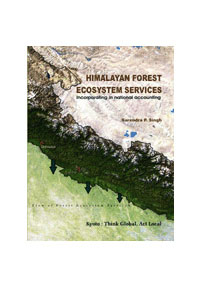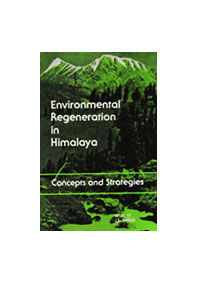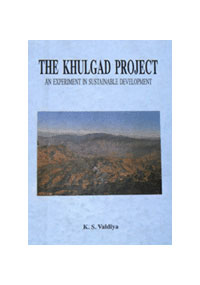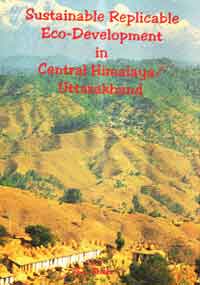 Book Store
Book Store

HIMALAYAN FOREST ECOSYSTEM SERVICES
Incorporating in national accounting - Prof. S. P. Singh FNA, FNASc
Resulting from interactions between biotic and abiotic components of ecosystems, ecosystem services sustain and fulfill human life and without them economics of the world would grind to a halt. Some of the common ecosystem services associated with forests are hydrologic regulation, climatic control, soil formation, carbon sequestration and recreation. The cost of products such as foodgrains, hydroelectricity and drinking water would be much higher if ecosystem services were fully accounted for in monetary terms. At present consumers do not pay for the services of ecosystems that are used to produce goods and services enjoyed by humans. Because of this natural ecosystems are liable to degrade and eventually collapse, leaving future generations with depleted natural capital and fewer options. In a major exercise by a team of economists and ecologists the monetary value of global ecosystem services was estimated at least, at $ 33 trillion, which was about as much as the then global GDP (in 1994).

The India Mountain Initiative
An Indian Initiative bringing Mountain concerns centre-stage - Dr. R.S. Tolia
The Indian Mountain Initiative, the InMI, proposes to repeat again, with some significant modifications, what the first Seminar held by CHEA in October 1983 obviously attempted to do a quarter century again, namely a pioneering a move to catalyze and galvanize all scientists, administrators, social workers and development practitioners to come together once more and collectively reflect again not only just on de-generation of environment but also on its intrinsic relationship with development. The Sustainable Mountain Development Agenda, the legacy of the Earth Summit of 1992, has now to be discussed much more horizontally and vertically, and much more frequently than a few stand-alone Seminars and Workshops. This collective reflection has to be undertaken in a much more Open and Continuous manner, as has also been recommended by the latest Task Force set up by the Government of India, on the mountain issues and concerns.
The Indian Mountain Initiative, as resolved by the CHEA Council and endorsed by its General Body, proposes to undertake this Open and Continuous Dialogue on mountain concerns, ( i ) through Annual Thematic Summits at Naini Tal, on a few selected themes, year after year , and ( ii ) by encouraging establishments of various Thematic Networks spread -over the Indian mountain states on various 'mountain - themes and concerns'.

Environment Regeneration in Himalaya
Concepts and Strategie Edited by- Prof. J.S. Singh
Possibly next to the tropical forest ecosystems,
the Himalayan biomes are ecologically of the greatest global concern. The task of
arresting the rapid degradation of the Himalayan environment, and its rejuvenation
and restoration, is a complex one, and call for an interdisciplinary approach.
In October, 1983, more than 150 people form India and abroad, including scientists,
administrators, social workers, and practitioners, of the environmental regeneration
programmes, participated in a seminar with the following major objectives (i)to
quantify the status and to identify the causes of degradation in the Himalayan
environment, (ii) to contribute towards evolving strategies for the regeneration of
the impaired environment, and (iii) to suggest the value system for the overall
development of the mountains.
This volume is a collection of 37 papers from the seminar, which cover aspects of environmental geology: mining and land slides; land use capability; forest ecology, management and policy; shifting cultivation; watershed ecology and management; socio-economics and migration; agriculture and animal husbandry; and limnology and fisheries. The papers range is scope from case studies to regional studies, and highlights the environmental problem and suggest remedies. Recommendations from the seminar are also included. The volume is profusely illustrated.

THE KHULGAD PROJECT
An Experiment in Sustainable Development - Prof. K.S. Valdiya
Out of 34 villages of the catchment of a stream that joins the Kosi River a tributary of the River Ganga in central Kumaun Himalaya, eleven villages were taken up for experimenting with an idea of development by village institution that would survive stresses of time and vagaries of a society in transition. Providing monetary incentive and technical expertise, CHEA ensures that villagers regenerated the natural environment and got what they wanted most from the things developed under the project. Resorting to the farming-systems approach, they integrated programmes of crop production, horticulture, vegetable growing and livestock development with intensive efforts of social forestry and agroforesty and protection of natural forests and springs and other water bodies. It was imperative that the involved villagers contributed 10 to 25% of the project cost in the form of labour, and that they managed the common asset thus created through village-level institutions such as Gram Sansadhan Prabandh Samiti and Mahila Mangal Dal.
"THE KHULGAD PROJECT An experiment in sustainable development" is the compilation of research papers developed by eminent scientists and academician working on various issues related to Khulgad watershed project.

Sustainable & Replicable Eco-Development in Central Himalaya/Uttarakhand
Editor- Prof. S.L. Shah
Proceeding of the Seminar on Action Research in Khulgad Micro Watershed of Kosi Catchment in Central Himalaya organized by CHEA. This book present the various articles which were presented and discussed in the Seminar and cover several aspects of eco-development of the Himalayan region. the articles present an integrated picture of conceptual, methodological and pragmatic issues in planning and management of natural and human resources. It has a focus on people's involvement and participation, essential for a sustainable and replicable resources use planning and management. It highlights the role of science, the identification of appropriate technology and effective methods of extension education in resource management.
Thus the book provides comprehensive, integrated and field tested methodologies for a sustainable and replicable eco-development of land, forest and water resources in Uttarakhand.